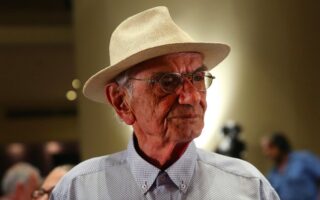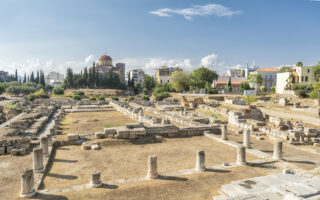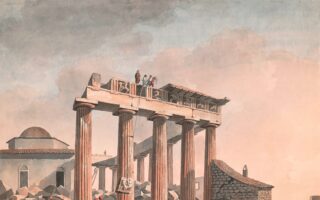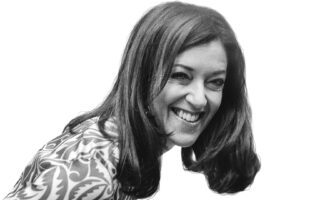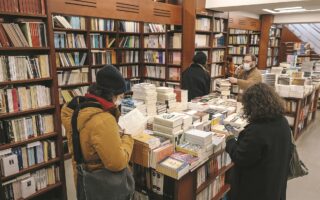Lycabettus Press publisher remembered
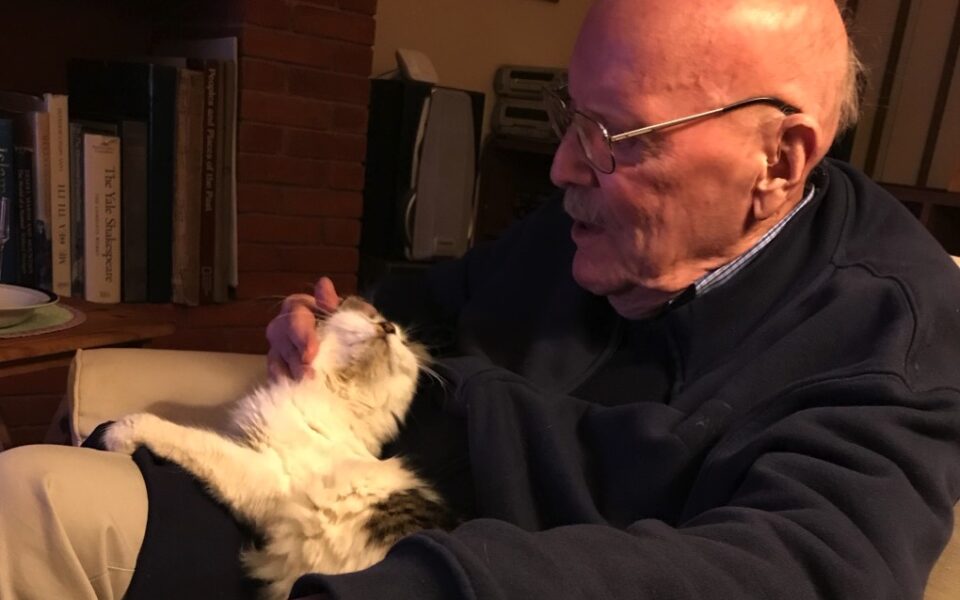
A few days ago, some 50 or so Athenians, mostly Greek and American, gathered at the invitation of his family to celebrate – in the home where he had lived and worked and hosted similar gatherings over the decades – their late friend John Chapple. It was his birthday. He would have turned 86.
An American by birth, by education an Arabist and a Greek by naturalization, Chapple leaves behind to his adoptive country a valuable legacy that deserves to become more widely known. It consists of the long and fascinating range of fine books that he edited, and especially those that he published himself through his company Lycabettus Press, established in 1968.
There is the legacy, and then there is the man. His good looks, gentle humor and unfailing courtesy instantly caught the attention and lodged in the memory of everyone he met as he crisscrossed the country distributing his books. What fewer people were in a position to appreciate – and this too deserves to become better known – was the remarkably open mind and lively curiosity with which he approached any fact or idea or point of view or human being not familiar to him. His piercing blue eyes would focus and he would lean forward to listen. It was an attitude to life, a moral stance, that he must have started acquiring in childhood.
John V. Chapple was born in Philadelphia to a family with English and Scottish roots. His father Dr Charles C. Chapple was a distinguished pediatrician who is remembered to this day as the inventor of numerous medical devices including humidifiers, inhalators, a chair bed and the modern incubator. After attending a local Quaker school, John went to Yale University, where he majored in English and competed on the swimming team, developing the meticulousness, discipline and stamina that he was to display in his later activities.
Upon graduation, he joined CARE, a humanitarian organization fighting global poverty, and left the US for a brief training stint in Ankara prior to a life-changing year-and-a-half posting to Cairo followed by a year and a half in Gaza. Deeply affected by his experience among the Palestinians, Chapple enrolled in the Middle Eastern Studies program at the American University of Beirut, where he learned Arabic, wrote a thesis on Zionism and in 1966 obtained his MA. He then returned to the US intending to pursue Arab and Byzantine history at Columbia University towards a PhD. On the side he started doing volunteer work as a member of the board of directors for Americans for Middle East Understanding (AMEU), an organization striving to raise awareness of the Palestinian perspective in the US. He was a founding member and he remained associated with it for many years, serving as vice president and acting president. He was also a member of the board of American Middle East Rehabilitation (AMER).
In New York, it was not long before the exigencies of life forced him to abandon academia and seek gainful employment. After a brief stab at a banking career, he took a job with the far more congenial Encyclopedia Britannica, working on an international publishing project under a Greek boss.
There and then began the Greek entanglement and involvement with editorial work that by 1972 found John Chapple with his first Greek wife settled in Athens with a young daughter, running a fledgling publishing company of which he soon became sole owner.
Initially, Lycabettus Press focused on putting out a series of quality guides to Greek sites and places of archaeological or historical interest. Experts were commissioned to write individual volumes. To give just three examples: “Vergina: The Royal Tombs and the Ancient City” (1972) was written by Manolis Andronikos, the excavator of the site; “Eastern Crete” (1975) by Effie Sapouna Sakellaraki, with her corresponding knowledge of that area; and “Naxos, Ariadne’s Isle” (1976) by John Freely, the noted travel writer and photographer.
Subsequently Chapple branched out to produce a broader range of books, all of primarily historical or ethnological interest and all having at least some connection with Greece. It was in his choice of authors and titles that his outstanding qualities of openness and curiosity towards the “other” were exercised to the full. For alongside some now classic volumes on the spread of Christianity, including Otto F.A. Meinardus’ “St Paul in Greece” and “St John of Patmos and the Seven Churches of the Apocalypse” and Robert B. Betts’ “Christians in the Arab East,” John Chapple, committed advocate of Palestinian rights, issued a long and important line of books revealing the depth of the Jewish experience in Greece. These included Rae Dalven’s “The Jews of Ioannina,” Nicholas Stavroulakis’ “Cookbook of the Jews of Greece,” Rena Molho and Vilma Hastaoglou-Martinidis’ “Jewish Sites in Thessaloniki,” and the first edition of Errikos Sevillias’ “Athens – Auschwitz.” Throwing light on further unexplored facets of Greek society, Tim Salmon’s “The Unwritten Places” takes us up the Pindos mountains to join Vlach nomads on their last transhumance trek; while John Brady Kiesling’s “Greek Urban Warriors: Resistance and Terrorism 1967-2014” submits the actions and words of Greece’s leftist guerrillas and of their pursuers to equally unstinting examination.
Taken all together, the books published by John V. Chapple under the Lycabettus Press imprint testify to his devotion to Greece and his desire to contribute something of value to his adoptive country. They were meant also to serve as a gentle reminder to his fellow Greeks that one of the country’s most admirable aspects, not always appreciated, is its richly varied multicultural tradition, still evolving today.
He is survived by his wife Fulla Artavanis-Chapple and his children Aliki Chapple (from his marriage to Kali Doxiadi) and Charles E. Chapple.
Some of the books published by Lycabettus Press:
“Athens – Auschwitz,” by Errikos Sevillias
“At Home in Athens,” Anne Harding & Beth Kolehmainen
“Bonnie’s Best Bites,” by Bonnie Tangalos
“Christians in the Arab East,” by Robert B. Betts
“Cookbook of the Jews of Greece,” by Nicholas Stavroulakis
“Delphi,” by Alan Walker
“Doorway to Greece,” by Mary Winterer-Papatassos
“Falconera,” by Alexis Ladas
“Greek Assignments,” by Michael Ward
“Greek Urban Warriors, Resistance and Terrorism 1967-2014,” by John Brady Kiesling
“In Sfakia,” by Peter Trudgill
“Jewish Sites in Thessaloniki, Brief History and Guide,” by R. Molho & V. Hastaoglou-Martinidi
“Kos,” by Chris & Christa Mee
“Lost in the Wilds of Greece,” by Penny Turner
“Nauplion,” by Timothy E. Gregory
“Naxos: Ariadne’s Isle,” by John Freely
“Paros,” by Jeffrey Carson & James Clark
“Patmos,” by Tom Stone
“Poros,” by Niki Stavrolakes
“St John of Patmos and the Seven Churches of the Apocalypse,” by Otto F.A. Meinardus
“St Paul in Greece,” by Otto F.A. Meinardus
“The Jews of Ioannina,” by Rae Dalven
“The Unwritten Places,” by Tim Salmon
“Tom Stone’s Greek Food and Drink Book,” by Tom Stone
“This Way to Paradise, Dancing on the Tables,” by Willard Manus
